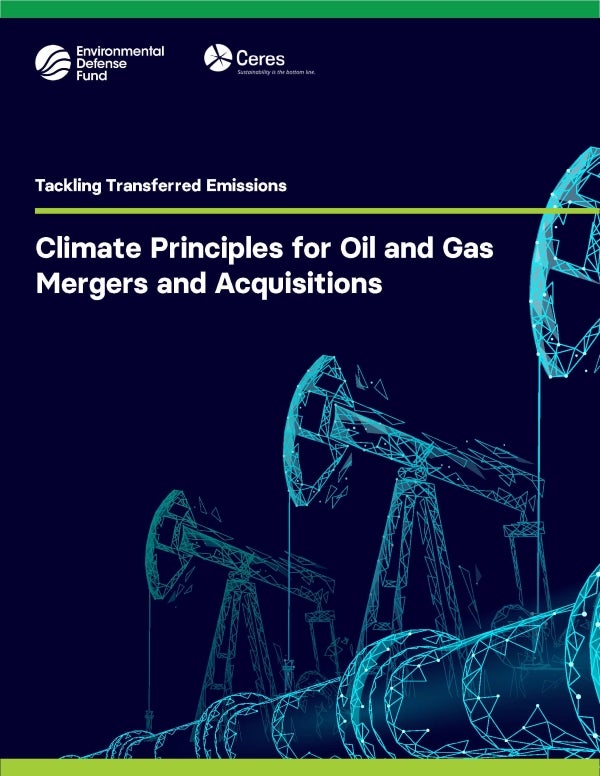- Resources
- Tackling transferred emissions: Climate principles for oil and gas mergers and acquisitions
Resources
Tackling transferred emissions: Climate principles for oil and gas mergers and acquisitions
Published: January 19, 2023 by Andrew Baxter
Transferred emissions
As oil and gas companies seek to reduce their greenhouse gas emissions to meet net zero targets, many have used divestiture as one avenue to decarbonize their portfolios.
Such transactions may help companies reach their own emissions reduction targets, but they do not contribute to global greenhouse gas emissions reduction — and may even result in overall emissions going up.
Selling oil and gas assets in order to shed emissions presents reputational, climate, and transition risks for the industry and financial institutions involved. Environmental Defense Fund and Ceres developed the Climate Principles for Oil and Gas Mergers and Acquisitions in consultation with NGOs, asset managers, private equity firms, banks, and oil & gas companies to forge a new paradigm more compatible with global climate goals.
The consultation process focused on developing principles that are ambitious and effective, yet practical enough to be used in real-world transactions.
Report highlights
The Climate Principles for Oil and Gas Mergers and Acquisitions are comprised of four elements:
- Pre-Deal Due Diligence: Diligence should be performed prior to the initiation of deals, including an assessment of both the climate standards of potential acquirers and their financial capacity to maintain those standards.
- Disclosure: Public reporting of emissions and environmental impact should continue after transfer, and parties should make clear what portion of any change in their emissions is due to transfers as opposed to other emissions reduction measures.
- Emissions Reduction Targets and Strategy: Sellers should assist buyers in maintaining or strengthening a transferred asset’s emission reduction targets and strategy by sharing best practices, and buyers should commit to continuity in standards when executing a purchase.
- Decommissioning: Buyers should determine a plan for the decommissioning of transferred assets including the expected cost and assigned liability.
Adoption of the principles
Mergers and acquisitions present an opportunity for leadership on climate risk. Oil and gas companies can strengthen their stewardship of capital by incorporating long-term thinking into transactions. Potential buyers can differentiate themselves and create value by incorporating climate considerations into deal terms. Investors and advisors, including lawyers and bankers, can achieve their GHG emissions reduction targets, lead the transition, and gain experience in a more sustainable and forward-looking way of doing business through thoughtfully executed M&A.
Firms looking to show leadership on climate should incorporate the Climate Principles for Oil and Gas Mergers and Acquisition into their practices and become a part of this important conversation.
Watch the webinar
Tackling Transferred Emissions: Climate Principles for Oil and Gas Mergers and Acquisitions
Transactions in the oil and gas industry can increase reputational, climate, and transition risks, but also present opportunities for industry to lead on creating a new paradigm for M&A more compatible with global net zero goals.






